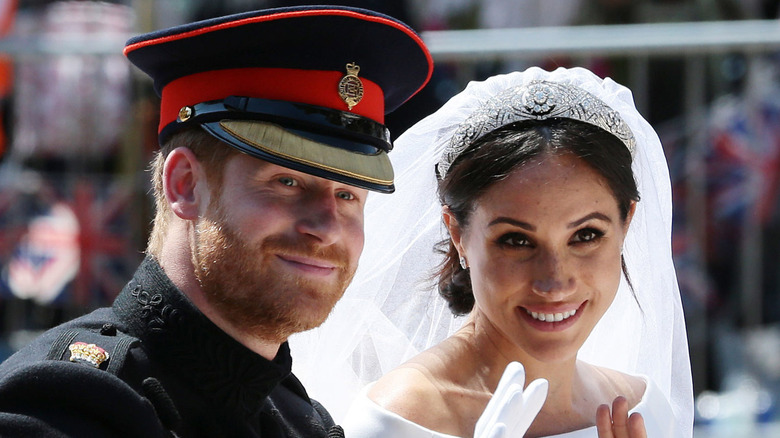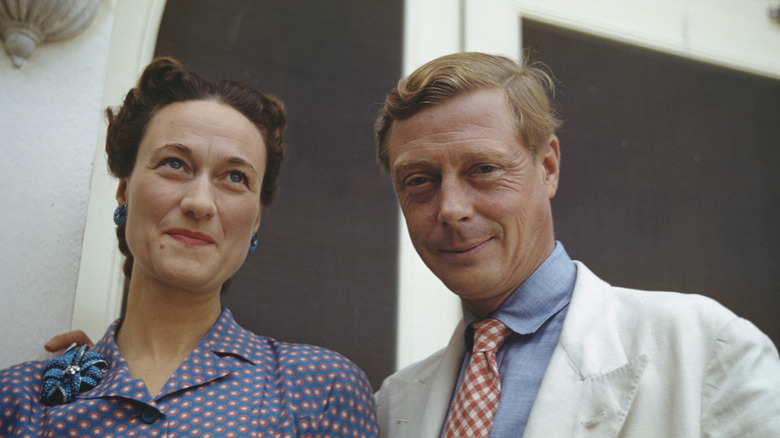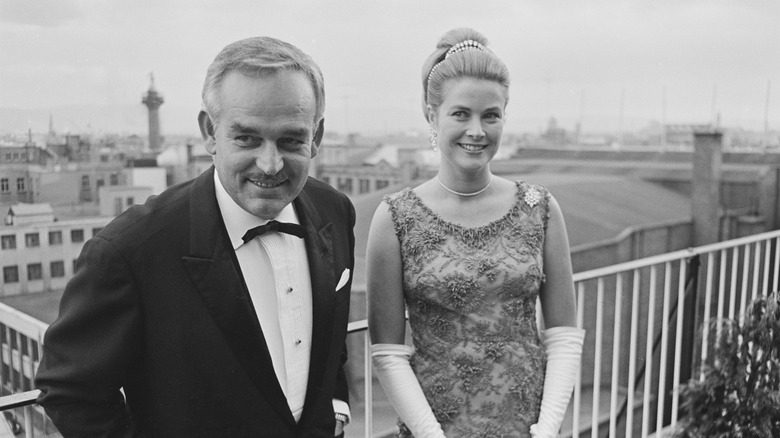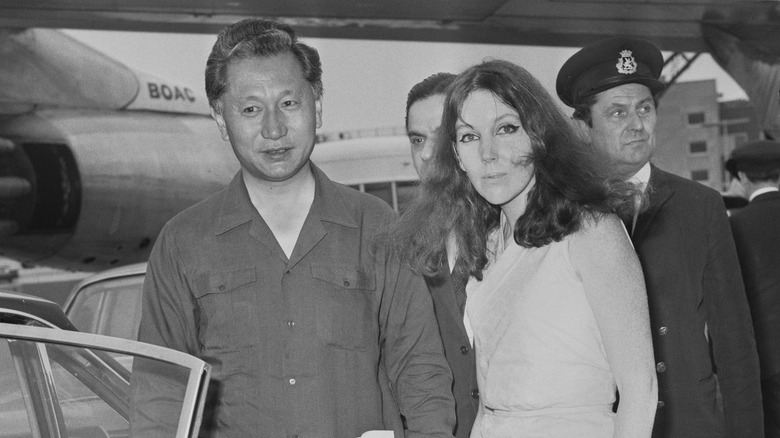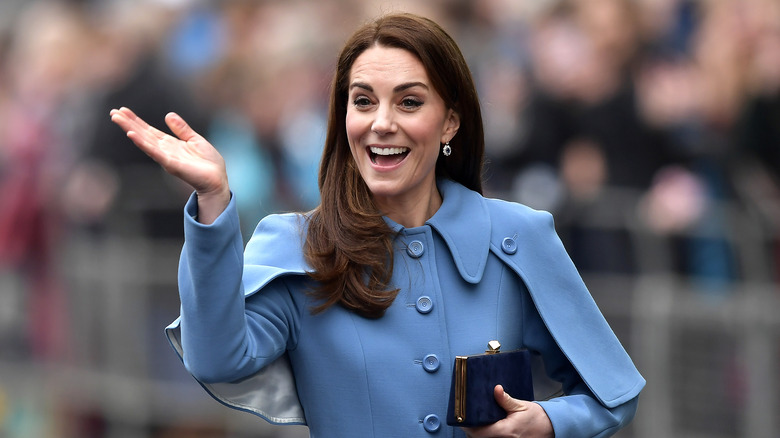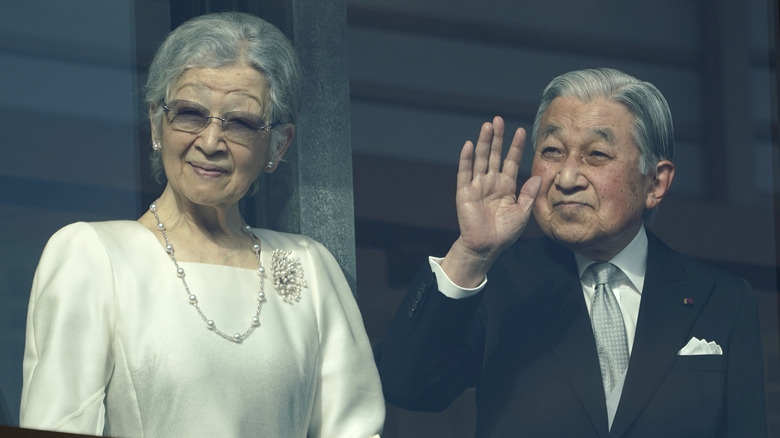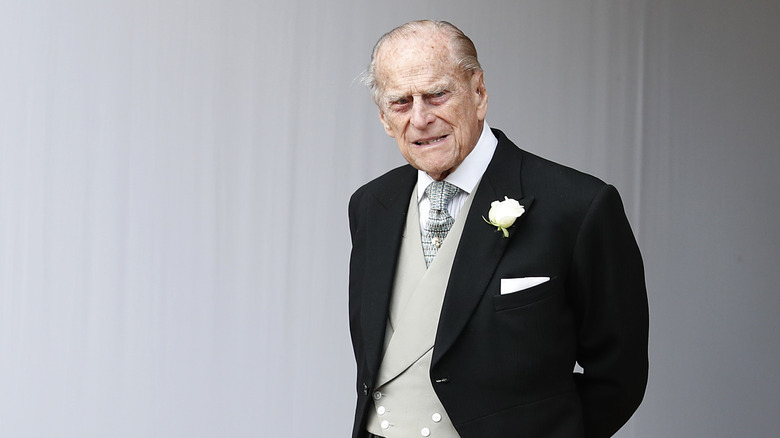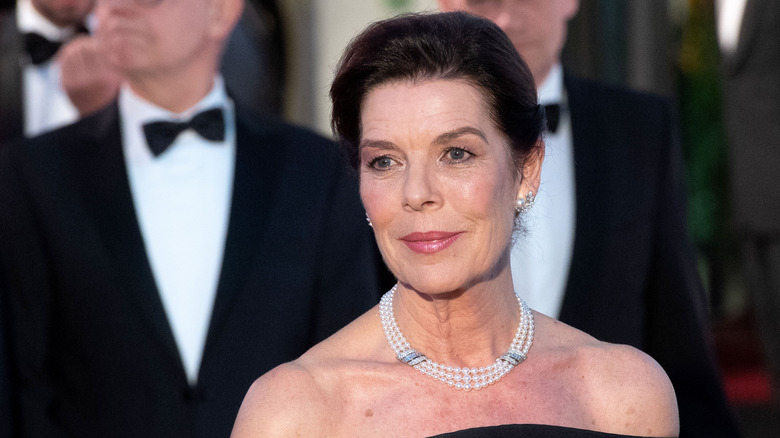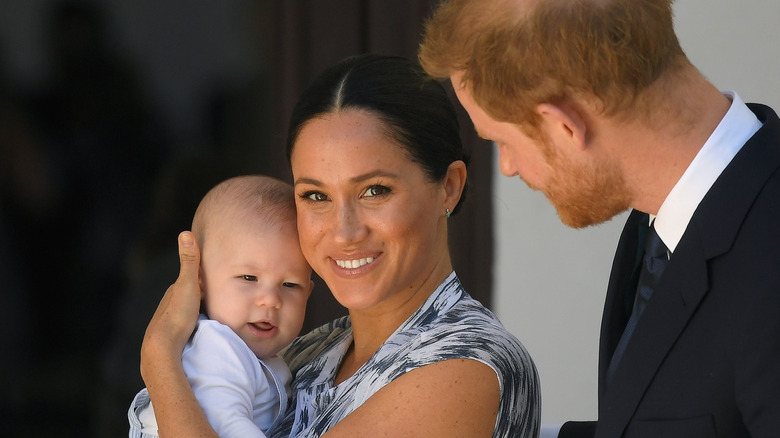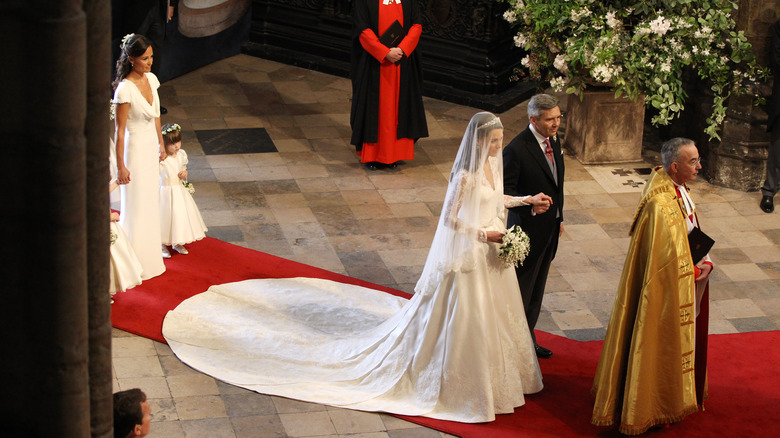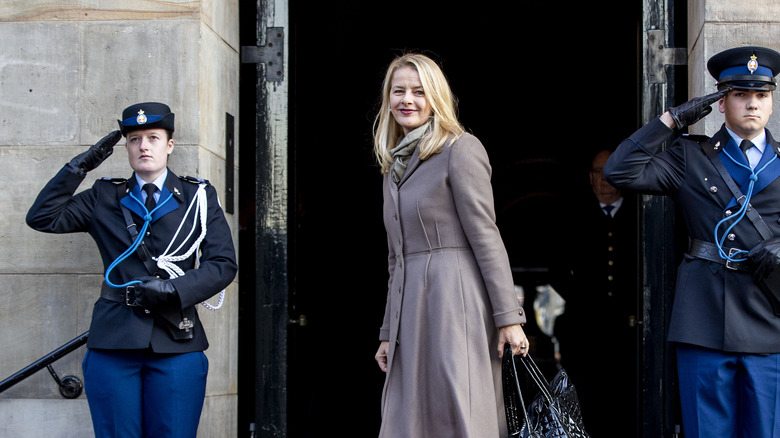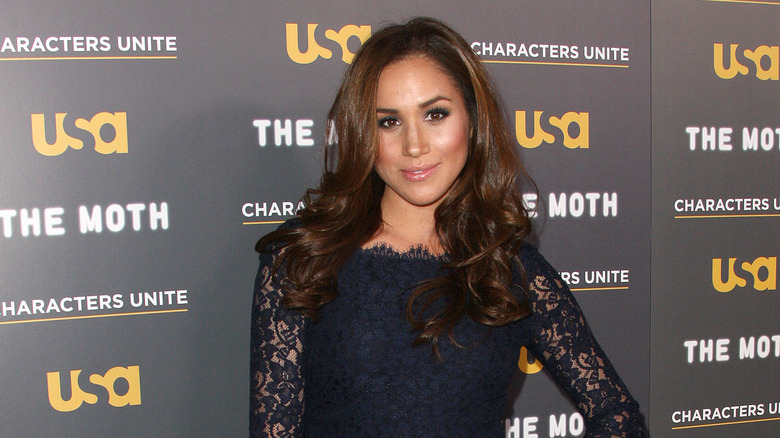What Really Happens When Royals Marry Commoners?
Common folk marrying into ancient, royal families — it seems like everybody's doing it these days. Not so long ago, royal families were incredibly picky about who their sons and daughters could marry, usually restricting their choices to other royal families, or even distant relatives. But times change. Not only are there fewer legit royal families left in the world, but perceptions of royalty have shifted, and the surviving royals have shifted their attitudes along with it. Aside from being more tolerant of modern innovations like divorce, they're also more open to marrying commoners.
For some, that's opened up the possibility that the old fairy tale of becoming a prince or princess might actually be made into reality. But marrying into royalty comes with a price — for both sides of the equation. The simple fact is that royal families are different. They live by different rules and interact with each other — and the rest of the world — in different ways than most regular people do. The adjustment can be brutal for commoners, and the choice of an inappropriate or unprepared spouse can have serious repercussions for royals.
If you've ever fantasized about marrying into a royal family, here's what really happens when royals marry commoners.
Sometimes royals lose their status
One of the most famous instances of a non-royal person marrying into a royal family involved the King of England. As noted by History, Edward VIII became King of Great Britain and Northern Ireland in 1936 when he was 40 years old. Shortly before his ascension, he'd fallen in love with an American socialite named Wallis Warfield Simpson. Simpson had two distinct marks against her from the royal family's point of view: She was a commoner, and she was divorced. Ultimately, Edward was forced to choose between the crown and his love. He chose Wallis, and after reigning for just 325 days, Edward stepped down, handing the crown to his brother, George VI.
Things were different back then, of course. As noted by The Seattle Times, Kate Middleton might be Duchess of Cambridge and destined to be queen consort — but she is technically a commoner, and yet the marriage went off without a hitch. But Inc.com reports that Japan's Imperial Princess Ayako gave up her royal status to marry Kei Moriya, and according to BBC News her sister Mako also gave up her royal titles to marry a commoner.
And although Prince William's younger brother Prince Harry didn't have to give up his royal status when he married commoner Meghan Markle, BBC News reports he did lose titles as a direct consequence. Nonetheless, Today reports that he is still technically sixth in the line of succession, so he could technically still be king despite the loss of status.
Commoners might have to give up their career
Contrary to popular belief, being a member of a royal family isn't all megayachts and fancy naval uniforms. Royal status in the modern age is often a full-time job, with royals expected to engage in diplomatic, humanitarian, and other work that benefits both the family and their country. At the same time, working any sort of "normal" job is frowned upon as being below your status.
As a result, when modern-day commoners marry into royalty, they're often shocked to discover they're expected to end their careers. As reported by Glamour, Meghan Markle not only felt compelled to end her acting career when she became engaged to Prince Harry, she also shuttered her site, The Tig, just as it was starting to gain real traction in the lucrative lifestyle market. When the couple decided they wanted to earn their own money and have the freedom to make a living their own way, they had to give up their royal titles to do so (via BBC News).
Markle's not alone. As reported by Livingly, legendary actress Grace Kelly had to retire from her acting career when she married Prince Rainier of Monaco. Interestingly, not only did she give up her profession, but the films she'd already made were banned in Monaco.
You might have to renounce your citizenship
As noted by Romper, when Meghan Markle married into the British royal family, there was some speculation that she might have to give up her American citizenship. That never happened, and according to Newsweek, Markle never became a British citizen, either. But the idea isn't so crazy — sometimes the price of marrying into a foreign country's royal family is your citizenship status.
People notes that Crown Princess Mary of Denmark was an Australian citizen when she began dating Crown Prince Frederik. The Danish parliament had to pass a special law to grant her Danish citizenship — but she was also forced to give up her status as an Australian in the process. Today, she is only a citizen of Denmark.
Another famous example is Hope Cooke. Ozy reports that Cooke was 19 years old when she met Palden Thondup Namgyal — Crown Prince of Sikkim — while traveling in India in 1959. They were engaged in 1961, but Sikkim law forced Cooke to renounce her American citizenship in order to marry Namgyal, which she did. The couple was married in 1963, and she became queen consort when Palden ascended to the throne in 1965. There were dire consequences: Cooke was miserable in her marriage, and when the throne fell as Sikkim was absorbed into India in the 1970s, she fled back to the U.S. — where she was an immigrant.
Commoners have to hit the books
It's no secret that royal families have a lot of crazy, complicated rules of etiquette and behavior. Most members of royal families have the advantage of studying these rules from birth. When you're a member of the common folk and you marry a royal, you might not realize that you're signing up for a crash course in ancient royal traditions.
As reported by Vogue, in the British royal family, for example, there are rules regarding everything from when to wear a tiara to whether or not you're allowed to remove your coat in public (the answer is a resounding no). You have to memorize your rank within the family so you'll know where to stand and how to show respect to other royals, and according to Newsweek, if you're a woman marrying into the British royal family, you might even have to learn how to sit in a very precise way known as the Duchess Slant.
You'll also be expected to learn how to do things you might assume were pretty basic — like how to drink your tea, and when it's appropriate to go to bed. Memorizing all of these rules is compulsory and very important because you're royalty now, and thus represent an entire country with everything you say and do.
There's a lot of emotional stress
You might assume that when a commoner marries into a royal family, their fellow commoners will be excited for them. After all, they come from a similar background, and now they're going to be rich and famous!
That's not always the case. In fact, commoners marrying into royal families often find themselves unpopular and even the target of sustained attack. As reported by Insider, Meghan Markle was the target of a coordinated, sustained campaign of harassment and hate on social media after she and Prince Harry announced their engagement. The attacks were a large reason why Harry and Meghan decided to step back from their royal status and move to the United States.
Markle's not alone. When Sofia Kristina Hellqvist married Prince Carl Philip of Sweden, People reports that the media mocked her past modeling career and appearances on reality television mercilessly. And attacks like this aren't always from the public. According to People, when Crown Prince Akihito of Japan married Michiko Shōda — daughter of a wealthy and powerful family, but a commoner all the same — the public loved her. But the imperial family treated her coldly, never warming up to the idea that a commoner could be the next empress.
Commoners lose the right to free speech
Royals occupy a unique place in society. In the past, royals were actively leading their countries, often ruling as autocrats or with immense power and influence. In the modern day, many royal houses are figureheads, and as a result any commoner marrying into one had best prepare to keep their opinions to themselves after the marriage — especially when it comes to politics.
For example, Redbook notes that the British royal family is generally prohibited not only from taking an active role in politics, but even from expressing political opinions. And according to Glamour, Meghan Markle was compelled to shut down her considerable social media presence when she married into the British royal family.
According to Vanity Fair, this is a deliberate policy for the royals. But surprisingly, there is also a long list of freedoms and rights enjoyed by commoners that the royals are denied, often including freedom of speech, religion, and travel, as well as a fundamental right to privacy. Bottom line: you might imagine marrying into royalty would increase your power in the world — but it often reduces it, and silences you to boot.
Commoners might not be king or queen
One thing you need to understand about commoners marring someone in the line of succession to the throne is that they're never going to be queen or king. The best Kate Middleton and Meghan Markle can hope for is queen consort — just as Queen Elizabeth II's husband wasn't King of England, but rather prince consort, per Harper's Bazaar. As explained by Time, the title of king or queen is only granted to a monarch who inherits the throne and can reign as such. Marrying into the family doesn't put you in the line of succession, so you can't actually have the title.
You might not even have a title at all. According to Huffpost, when businessman Christopher O'Neill married Princess Madeleine of Sweden, he not only chose not to become a Swedish citizen, he renounced any royal title in order to continue his career. And Markle and Prince Harry famously gave up their royal titles in order to have more control over their lives (per BBC News).
This isn't a universal practice, however — according to Insider, Sonja Haraldsen was a commoner who married Crown Prince Harald and became Queen of Norway when he took the throne. And Silvia Sommerlath became Queen of Sweden when her husband, Carl Gustaf, became King. The lesson is, if you're marrying royalty hoping to be king or queen, check the rules first.
Divorce is not easy
No one gets married thinking about how the divorce will go, but in the modern day divorce is a fact of life — even for royals. As noted by AP News, in Great Britain just a century ago, King Edward VIII lost his crown simply because he insisted on marrying a divorced woman, and when Princess Margaret divorced Antony Armstrong-Jones in 1978, People tells us it was the first divorce involving a senior royal since 1901.
Divorce is more accepted in royal circles today, but it's still not easy. When Prince Charles and Princess Diana decided their marriage was over, they spent three long years officially separated before they received permission to even begin divorce proceedings from Queen Elizabeth, according to the Los Angeles Times. And as former Duchess of York Sarah Ferguson discovered when she divorced Prince Andrew in 1996, your former family will very likely shun you in public and treat you very, very badly post-divorce, according to InStyle.
It's not just the British. Princess Caroline of Monaco married Prince Ernst August of Hanover in 1999, but according to Town & Country Magazine they separated in 2009 — and Tatler confirms they're still separated as of 2021, which means they've been living separate lives for more than 12 years, a testament to the difficulty in dividing assets and titles in a royal divorce.
Your kids might not be royal
The rules surrounding royal status don't always make sense to commoners. For example, if you marry into the British royal family and have children, you might assume that your kids will automatically be royal — but according to Elle, you would be wrong. Prince William's children, Princes George and Louis and Princess Charlotte, are technically commoners despite their parentage — and the fact that George is now third in line for the throne according to The Royal Family's official website.
As historian Marlene Koenig explained to Town & Country Magazine, the only people in the United Kingdom who aren't commoners are the monarch and the "peers of the realm" (think dukes and earls and barons). As a result, simply marrying into the royal family (or being born into it) doesn't make you royal — the title is what does it. Eventually, Prince William and Duchess Kate's children will likely get those titles, and leave all other commoners behind — but it's not guaranteed.
In fact, if you marry into a royal family and break the rules, your children might not get any title at all — which is what happened when Meghan Markle and Prince Harry gave up their royal duties. According to CBS News their son, Archie, is the only one of Queen Elizabeth II's grandchildren who wasn't awarded any title at all — according to Cosmopolitan, he'll simply be known as "Master."
Forget about planning your own wedding
If you've ever imagined your wedding and how much fun it will be to plan, you might think that marrying into royalty would be the best. After all, the money, the glamour, the royalness of it all must make wedding planning a dream. But if you've also ever worried that your in-laws might hijack the planning, you would be best advised to avoid any royal romances. Because if one thing is certain, you will have extremely little influence over your own wedding if you marry into royalty.
As reported by CBS News, everything is more or less predetermined for you by tradition. While the bride's wedding dress can be designed for the occasion, there is a long list of rules regarding the material and how much skin the gown can show — no bare shoulders, for example, and no cleavage. Even the location of your first kiss as a married couple is dictated by tradition.
In fact, according to HuffPost, if the groom is the royal he'll wear a military uniform, the composition of the bride's bouquet must contain a sprig of myrtle regardless of her feelings on the matter, and even the wedding band you'll put on your finger is predetermined — it will be made from Welsh gold whether you like it or not.
There will be a thorough vetting
When two people meet and decide to spend the rest of their lives together, there's usually an organic revelation of secrets. Most normal people understand that hiding your past from your future spouse is probably not the best way to kick off a relationship. But if you're marrying into a royal family as a commoner, you should brace yourself for a pretty thorough vetting process that will probably reveal more than you might like.
According to The Observer, for example, when Prince Johan Friso of The Netherlands proposed to Mabel Wisse Smit, the Dutch royal family set the vetting process in motion — and did not like what they found. As reported by USA Today, Wisse Smit hid her friendship with notorious criminal Klaas Bruinsma. The government refused to sanction the wedding, and Prince Johan renounced his claim to the throne as a result. And according to the Tampa Bay Times, when a feud within the royal family of the Netherlands turned ugly, Princess Margarita de Bourbon de Parme accused them of using the vetting process to launch a smear campaign against her commoner husband, Edwin de Roy van Zuydewijn.
And although it wasn't a secret and didn't stop the wedding, The New York Post notes that when Sofia Hellqvist married into the Swedish royal family, her extremely wild past as a model and party girl was plastered everywhere, scandalizing the Swedes.
Being royal becomes a little less special
As noted by Town & Country Magazine, commoners marrying into royal families is no longer the rarity it once was — it's actually almost the norm. In fact, nine out of the 10 surviving hereditary European monarchies have seen the heirs marry way below their station. And every time a commoner marries into a royal family, it underscores the fact that there's really nothing special about being royal aside from the ancient name and, in most cases, the huge fortune that comes with ruling — or possibly owning — an entire country.
Town & Country Magazine also notes that even someone like Kate Middleton, who comes from a wealthy background, is affecting the status and perception of royalty. Kate is a commoner, but the distinction seems silly when she was privileged enough to first meet her husband, Prince William, at college (via The Seattle Times). And as The Washington Post points out, Prince Harry and Meghan Markle's decision to give up the royal life and pursue careers in America has reduced them to mere celebrities — famous people instead of members of an ancient ruling family. Commoners marrying into royalty may soon no longer command headlines and blog posts, which is bad news for royals everywhere.
